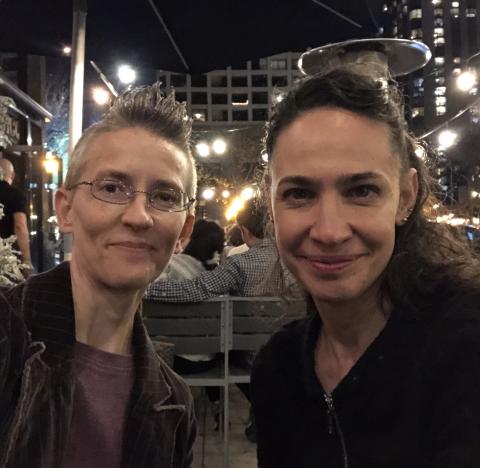
Movement moves across time, bodies, and places. How can visceral approaches to digitally curating, analyzing, and visualizing dance data amplify transnational, intergenerational, and intercultural understandings of dance’s histories?
Harmony Bench (The Ohio State University) and Kate Elswit (Royal Central School of Speech and Drama) have been collaboratively developing a digital humanities practice since 2013. We first began with a collaborative peer-review process for our respective individual projects on dance touring and digital methods, and then structured increasingly entwined projects, beginning with Dance in Transit (2016-18), followed by the award-winning project Dunham’s Data: Katherine Dunham and Digital Methods for Dance Historical Inquiry (2018-22), about the questions and problems that make the analysis and visualization of data meaningful for dance. We are currently continuing our research with Visceral Histories, Visual Arguments: Dance-Based Approaches to Data (2022-25), which unpicks many of the questions that have arisen along the way about the ways in which digital methods need to be modified to better engage with the dance-based knowledge practices that underlie dance history, and the implications for broader approaches to bodies in the critical digital humanities. We are also now exploring how such work might change public engagement with dance history.
Principal Investigators
Harmony Bench is Associate Professor of Dance at The Ohio State University and author of Perpetual Motion: Dance, Digital Cultures, and the Common (University of Minnesota Press, 2020). Her research addresses practices, performances, and circulations of dance in the contexts of digital and screen media, and she has a new project in progress on kinesthetic affect in dance film. From 2014-2019, she co-edited The International Journal of Screendance with Simon Ellis, and in 2021, she guest-edited the special issue This Is Where We Dance Now: COVID-19 and the New and Next in Dance Onscreen with Alexandra Harlig. For nearly a decade, she and Kate Elswit have collaborated to bring the digital humanities and dance history into greater dialogue through computational analysis and data visualization. Their projects together include the award-winning Dunham’s Data: Katherine Dunham and Digital Methods for Dance Historical Inquiry (Ref: AH/R012989/1; www.dunhamsdata.org), and more recently Visceral Histories/Visual Arguments: Dance-Based Approaches to Data (https://visceralhistories.wordpress.com/).
Kate Elswit is a scholar–artist whose research on performing bodies combines dance history, performance theory, cultural studies, medical humanities, experimental practice, and technology. She received her PhD from the University of Cambridge, and is now Head of Digital Research and Professor of Performance and Technology at the Royal Central School of Speech and Drama, University of London. For the past decade, she has been collaborating with Harmony Bench on projects to bring dance history and the digital humanities into conversation, including the AHRC-funded projects Visceral Histories, Visual Arguments: Dance-Based Approaches to Data (2022-25) and Dunham’s Data: Katherine Dunham and Digital Methods for Dance Historical Inquiry (2018-22), which won the ATHE-ASTR Award for Excellence in Digital Theatre and Performance Scholarship. She is the author of Watching Weimar Dance (2014), winner of the Oscar G. Brockett Book Prize for Dance Research and honorable mention for the Callaway Prize, and of Theatre & Dance (2018), and is currently also at work on a monograph on the intersections of breath, performance, and measurement from the Victorian era to the present.